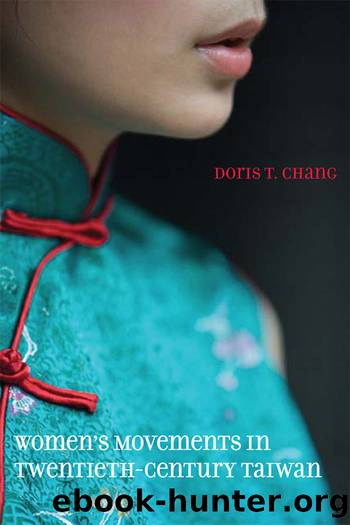Women's Movements in Twentieth-Century Taiwan by Doris Chang

Author:Doris Chang [Chang, Doris]
Language: eng
Format: epub
Tags: Social Science, General, Women's Studies, Feminism & Feminist Theory, History, Asia
ISBN: 9780252090813
Google: jRtsdbiELx8C
Publisher: University of Illinois Press
Published: 2010-10-01T02:42:45+00:00
The Eugenic Law for the Protection of Health
In 1984, the passage of the Eugenic Bill for the Protection of Health greatly enhanced womenâs reproductive choices. That year, Awakening became the vanguard of non-governmental affiliated groups petitioning for the billâs passage in the Legislative Yuan. Drafted by the Kuomintang governmentâs Department of Public Health in 1971, the Eugenic Law (Yousheng baojianfa) was approved by the Executive Yuan in 1982 and sent to the Legislative Yuan for further deliberation. In 1984, the Legislative Yuan passed the bill and legalized abortion in Taiwan.41
The Eugenic Law for the Protection of Health states that a pregnant woman is exempted from prosecution for abortion: (1) if she or her spouse has a hereditary or a contagious disease, (2) if the fetus were severely handicapped, (3) if the pregnancy were caused by rape or incest, (4) if the pregnancy endangers the womanâs life, or (5) if the pregnancy negatively affects the womanâs mental health or family life, on the condition that the woman acquires the consent of her husband to obtain an abortion.42 If the female were a legal minor, she would need the signature of a legal guardian. In other words, only the fifth situation requires a woman to acquire the consent of her husband or a legal guardian to obtain a legal abortion. A woman could choose to have an abortion without the consent of either her husband or a legal guarantor in the first four cases.43
During deliberations over the bill, fifty legislators opposed its last provision. They contended that the exemption of women from prosecution for abortion on the grounds of the negative effect on their mental health or family life amounted to de facto legalization of unlimited abortion. Further, they argued that the legalization of abortion would increase instances of sexual promiscuity in society. To convince the socially conservative Legislative Yuan that the Eugenic Law should be passed in its entirety, Awakening feminists argued that there is no evidence to suggest that legalizing abortion causes an increase in sexual promiscuity. They argued that selective, legalized abortion could protect womenâs health and save womenâs lives from unregulated illegal abortions. Legalized abortion could also control population growth and thereby ensure social stability. Since Taiwan had the second highest population density in the world, the Awakening feminists, as a matter of strategy, appealed to the Kuomintangâs family planning campaign as a rationale for passage of the legislation. To ensure the socially conservative legislatorsâ support for the Eugenic Law, the Awakening feminists emphasized passage of the legislation for the good of the entire society rather than based on a womanâs individual right to control her own body.44
In the 1970s, Lu Hsiu-lien contended that the legalization of abortion was essential for protecting a womanâs right to control her own body.45 As proponents of womenâs rights, some feminists had misgivings about the clause in the law that stipulated the need for the husbandâs consent to abort a fetus. Lee Yuan-chen was troubled by the stateâs power to limit the number of obstetricians permitted to perform legal abortions.
Download
This site does not store any files on its server. We only index and link to content provided by other sites. Please contact the content providers to delete copyright contents if any and email us, we'll remove relevant links or contents immediately.
| Central Asia | Southeast Asia |
| China | Hong Kong |
| India | Japan |
| Korea | Pakistan |
| Philippines | Russia |
The Sympathizer by Viet Thanh Nguyen(4381)
The Rape of Nanking by Iris Chang(4193)
World without end by Ken Follett(3468)
Ants Among Elephants by Sujatha Gidla(3452)
Blood and Sand by Alex Von Tunzelmann(3184)
Japanese Design by Patricia J. Graham(3159)
The Queen of Nothing by Holly Black(2577)
City of Djinns: a year in Delhi by William Dalrymple(2543)
Foreign Devils on the Silk Road: The Search for the Lost Treasures of Central Asia by Peter Hopkirk(2453)
India's Ancient Past by R.S. Sharma(2441)
Inglorious Empire by Shashi Tharoor(2427)
Tokyo by Rob Goss(2423)
In Order to Live: A North Korean Girl's Journey to Freedom by Yeonmi Park(2373)
Tokyo Geek's Guide: Manga, Anime, Gaming, Cosplay, Toys, Idols & More - The Ultimate Guide to Japan's Otaku Culture by Simone Gianni(2356)
India's biggest cover-up by Dhar Anuj(2343)
The Great Game: On Secret Service in High Asia by Peter Hopkirk(2327)
Goodbye Madame Butterfly(2243)
Batik by Rudolf Smend(2173)
Living Silence in Burma by Christina Fink(2058)
